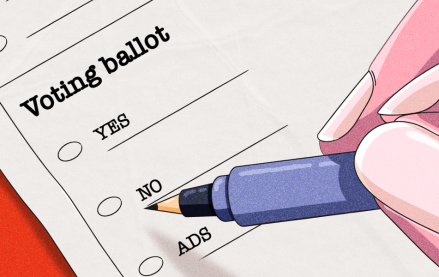Antidote to extremist headlines: Johnston Press news title The i Paper finds new readers
The i Paper, which launched in print and online in the U.K. in 2010 during a tumultuous time for media, had its work cut out for it in building a distinctive news brand in a cluttered space. Thanks to its politically neutral stance and digestible news coverage, it’s starting to make gains.
When the concise newspaper launched, it touted its balanced editorial viewpoint. As countless studies show, the general public is fatigued with partisan and sensationalist news, making the i Paper an increasingly refreshing refuge for readers.
The title launched as a sister paper to The Independent before being sold to Johnston Press in 2016 after the ESI Media news brand went online only. The parent company said The i Paper is profitable, and despite a young brand with a lean team, turning a profit in news publishing is no easy feat. To propel The i Paper into its next stage of growth, Johnston Press hired Luke Lewis, former BuzzFeed UK editor-in-chief, as head of audience in January. Since then, the title has grown the digital team from six to 16 people, mostly in editorial roles.
Since January, according to SimilarWeb, total monthly visits on desktop and mobile have nearly doubled, albeit from a low base, from 3.7 million to 7.3 million, with 61 percent of the title’s traffic coming from search.
With a lean team, The i Paper knows it can’t compete on breaking news with the hefty editorial might of the BBC, MailOnline and The Guardian. Instead, after discovering that its readers wanted more U.K. politics coverage, it focused reporting on explainers and how politics impacts daily life, like what impact a no-Brexit deal will have on the cost of groceries, rather than the Westminster intrigues or updates from Chequers. It also focuses on verticals like travel, sport and personal finance. At the beginning of July, it launched this series where asked people on different income levels to describe their outgoings.
According to Lewis, Facebook referral traffic has been volatile but broadly flat, whereas Google referrals have doubled, mostly coming from AMP.
“You can think about SEO in a focused and intelligent way — what information does the audience want to know today — it doesn’t have to be a fusillade of questions,” he said. Rather than quick hits, one of the most-read stories in the last six months was this 3,000-word feature on endangered great white sharks in South Africa. This on Northern Ireland’s Ballymurphy massacre also ranks high as a most-read piece thanks to strong search traffic.
Implementing audience-growth tactics will lead to audience hikes, but Nic Newman, editor of the Reuters Institute Digital News Report, acknowledges there will be a limit to The i Paper’s growth, and other news brands that rely on platforms for traffic. “The i Paper isn’t a destination brand like some news publishers,” he said, adding that on average people in the U.K. use 4.5 different sources of news a week thanks to digital access. “People look to news brands for opinion; they want both, they just don’t want spin or agenda.”
Aware that it can’t win a game of scale, The i Paper is building out new products and revenue streams next year that will focus on rewarding its core fan base. Currently, it has one daily newsletter with 15,000 — which it plans to double by the end of the year — which has a healthy open rate of 32 percent (Mailchimp’s benchmarks for media newsletters is 22 percent). It will add more niche newsletters including one on fantasy football. Events will also be a growth area, and the title is considering a registration wall where readers can get access to extra features.
“People who have made a decision to read us over their existing news brand says something about how they feel about independence of opinion, their own politics or news brands that are not partisan,” said Lewis. “We want to reward the most loyal readers by making it feel like a club of like-minded people.”
Currently, the title makes money through programmatic ads and branded content. It extends reach across Johnston’s 170 local news sites including the Scotsman, Yorkshire Post and Sheffield Star. The title’s political stance is reflected in its clean, simple and ad-low interface, said Newman, making it stand out from other news sites that have opted to load ads on site over user experience.
Agencies believe The i Paper has done a reasonably good job at carving out a space in a busy environment with slim resources. While agencies need to make clear impartial buying decisions based on audiences rather than the political leaning of the publisher, proving readers are engaged through retention metrics like dwell time and returning younger visitors is appealing and will put The i Paper in a stronger position.
Additions like events will add incremental value for advertiser brand extensions, but that’s more of a nice-to-have than a game changer, said Mark Holden, global strategy director at agency Starcom, because the numbers will be limited. Instead, building more scalable ways for brands to work with the publisher, for instance through licensing content on social media and expanding video will make it increasingly appealing.
“Getting to a place where the publisher has quality of audience and quality of content puts it in a better place than playing the numbers game,” points out Holden. “Scale can be bought.”
More in Media

Publishers revamp their newsletter offerings to engage audiences amid threat of AI and declining referral traffic
Publishers like Axios, Eater, the Guardian, theSkimm and Snopes are either growing or revamping their newsletter offerings to engage audiences as a wave of generative AI advancements increases the need for original content and referral traffic declines push publishers to find alternative ways to reach readers.

The Guardian US is starting its pursuit of political ad dollars
The Guardian US is entering the race for political ad dollars.

How much is Possible’s future in Michael Kassan’s hands?
Some people in the know at Possible said they see the conference taking a bite out of Cannes’ attendance, most acutely by U.S.-based marketers who could save money by staying on this side of the Atlantic.







